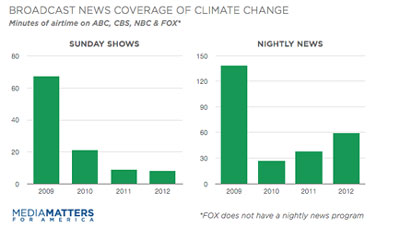Even a year of record-breaking extreme weather – heat, drought, wildfires and Sandy – couldn’t get the mainstream TV media to report on climate change, and that could get even worse with the NY Times closing its Environment Desk.
Coverage during 2012 – the warmest year on record in the US – hit bottom on Sunday news shows with less than 8 minutes spent on climate change. Coverage on nightly news rose a bit to just under an hour.
The Media Matters analysis also shows that coverage was biased. "Scientists were shut out of the debate while Republican politicians were given a platform to question the science." And Sunday shows didn’t quote a single Democrat’s position on climate change. The same imbalance was true of nightly news, but less dramatic.
That’s right – not one scientist has been invited to discuss climate change on Sunday shows since 2009!

"Not only did the Sunday shows shut out those who accept the science of climate change, but they also failed to inform their audiences that the vast majority of climate scientists agree that climate change is occurring and is driven by human activity. Only 11% of coverage implied that scientists agree on global warming, while 44% failed to correct a guest who questioned the science. By contrast, 60% of nightly news coverage alluded to the scientific consensus," says Media Matters.
New York Times Closes Environment Desk
Among the five largest US daily newspapers, the New York Times has covered climate change the most, but now the paper is closing its Environment Desk in the next few weeks.
That’s after its assistant managing editor Glenn Kramon told The Daily Climate, "Climate change is one of the few subjects so important that we need to be oblivious to cycles and just cover it as hard as we can all the time."
Calling it a "structural matter," the Times insists it won’t affect the news. The same seven reporters and two editors will just be shifted to other departments, they say, but the positions of environment editor and deputy environment editor are being eliminated.
"It wasn’t a decision we made lightly," Dean Baquet, managing editor for news operations told InsideClimate News. "To both me and Jill [Abramson, executive editor], coverage of the environment is what separates the New York Times from other papers. We devote a lot of resources to it, now more than ever. We have not lost any desire for environmental coverage. This is purely a structural matter."
But, "When you abolish a standalone beat, it sends a strong message to every career-conscious reporter and editor that chasing environment stories is not a path to advancement," Peter Dykstra, an award-winning reporter and a 17-year veteran of CNN told Joe Romm. Dykstra now publishes the Daily Climate.
And, "As the still-influential ‘paper of record,’ it sends a very bad message to the rest of the media, Dr. Robert Brulle of Drexel University, told Romm. Last year, the NY Times quoted him as "an expert on environmental communications."
This will accelerate the disappearance of climate change from our public discourse, he says. "Over the past year, the Obama Administration has been silent on the topic, and we have just had a Presidential campaign in which climate change was never discussed." Despite their official statements to the contrary, the move by the NY Times will reduce the paper’s institutional focus and capacity to report on environmental issues, he says.
Even the public editor of the NY Times wrote a column, "Keeping Environmental Reporting Strong Won’t Be Easy."
Climate blogger Andy Revkin views the situation as part of the downsizing of mainstream media, where "specialized journalism gets hurt first."
While separating environment into its own "beat" also has a downside of creating a "ghetto for the subject", he thinks eliminating the environment Editor position as a mistake. "More than ever, the paper needs someone to track, coordinate and vet the environmental content coming through any desk…"
The Times insists it’s not about budgets, but environmental stories are more complex, requiring interdisciplinary coverage, "partly business, economic, national or local, among other subjects," managing editor Dean Baquet told InsideClimate News.
Recently, the Times made a similar decision about its Education desk and is considering it for religious coverage.
